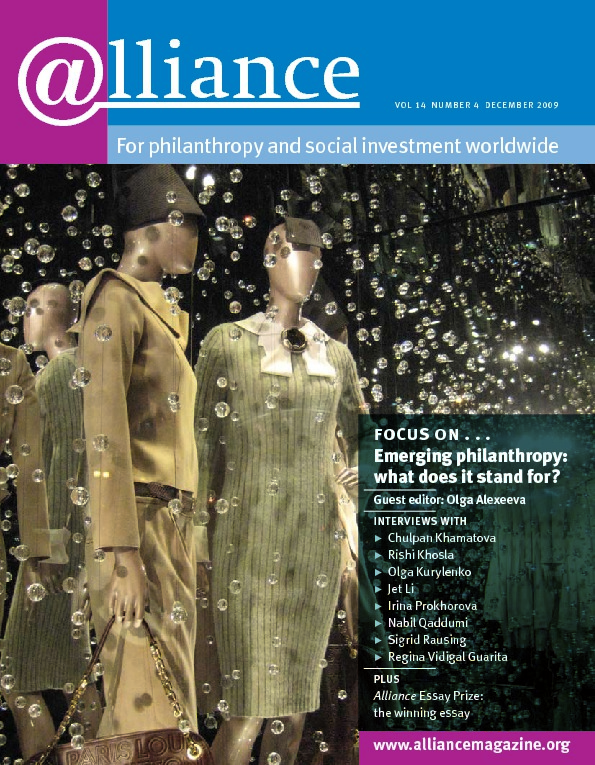Conflicting views and indications reflect the uncertainty caused by the financial crisis and the variability of its effects. As expected, it continues to take its toll on foundations and non-profits around the world, but though the outlook continues unsettled, not everyone feels it is gloomy.
Fifty per cent of not-for-profit organizations globally report a decline in income over the past year, says the Management Centre’s Global Fundraising Confidence Survey 2009. Non-profits in Asia were hardest hit with an average income fall of 13 per cent, compared to an average decline of 1 per cent in Europe. However, 33 per cent actually reported an increase and fundraisers’ confidence worldwide is growing, says the survey, with 56 per cent saying that they feel more optimistic about donations in the coming 12 months. In spite of the above figures, Europeans are more pessimistic than any other region, with only 30 per cent feeling optimistic, compared to 70 per cent of Asians and Australasians.
Outlook gloomy in the US …
Across the Atlantic, a survey by The Chronicle of Philanthropy of the US’s 400 most successful fundraising organizations suggests that giving will drop by a median 9 per cent this year, with the outlook for 2010 not much better. Non-profit officials say they are hopeful that the stock market’s climb will prompt donors to give more, but they fear that foundations and corporations might cut back further.
In addition, US community foundations suffered investment losses of 27 per cent last year, according to a survey by the Council on Foundations (COF). However, says Monica Wroblewski, a spokeswoman for COF, investment gains from previous years mean that many ‘community foundations are in the fortunate position of having considerable liquidity to fund grant-making’.
… and mixed reports in the UK
In the UK, Lloyds TSB Foundation for Scotland has suspended grantmaking indefinitely following the announcement that its sole funder, Lloyds Banking Group, reported no profits for this year (see Alliance eBulletin, November 2009). The National Council for Voluntary Organizations and Charities Aid Foundation reported in September (UK Giving 2009) that donations to the UK’s 170,000 charities have dropped by 11 per cent to £9.9 billion over the past year. According to the survey, however, the number of people who give is holding more or less steady, showing only a 2 per cent decrease over the previous year.
Against this, research by Sheffield Hallam University and the University of Kent, published in October, appears to indicate that the recession may be having less of an impact on charitable giving than media coverage suggests. The research highlighted a number of major UK fundraising appeals, such as Comic Relief and BBC Children in Need, that have reached record-breaking levels during the downturn.
German foundations come together in ‘particularly trying times’
In order to examine the effects of the crisis on its members, the Association of German Foundations (BDS) organized the extraordinary congress ‘Perspective 2015 – How foundations can act in particularly trying times’ on 23 and 24 September at the Foundation University, Hildesheim. This was attended by nearly 200 member foundations.
Under German state foundation laws, foundations are required to maintain the value of their assets. Investment policies are therefore traditionally rather conservative, which explains why most German foundations perceive the current situation as less dramatic than most of those in the rest of Europe. The general view, as summed up by BDS board member Dr Roland Kaehlbrandt: ‘We have to be cautious, but at the same time remain open for innovation.’ Another widely expressed opinion was that the crisis will accelerate the trend towards cooperation.
The association will publish the most important conference contributions under the title How Foundations can act effectively: Strategies and tips not only for times of crisis. It will be available around the turn of the year.
For more information
http://www.stiftungen.org/verlag
Heidelberg Centre asks: What’s next for social investment, non-profits and philanthropy?
What has been the impact of the financial crisis on social investments, non-profit operations and philanthropy? The topic was examined by a symposium of 30-odd scholars and practitioners from Europe, Israel and the US that took place on 17 and 18 September in Heidelberg, Germany, organized by the University of Heidelberg’s Centre for Social Investment.
Foundations everywhere have seen their assets, and therefore their ability to make grants, reduced significantly. Social investment, on the other hand, seems to have benefited from a search for alternatives on the part of investors and social entrepreneurs alike. The chief response by non-profits and foundations has been retrenchment, and few have seen the crisis as an opportunity to innovate. Some organizations, however, are engaging in longer-term planning, diversifying their programmes and resources, collaborating, considering and planning mergers, and even engaging more in advocacy.
Sector- and policy-level reactions have also varied across countries. In some places, such as Israel and the UK, the non-profit sector has sought legal, tax or regulatory changes or immediate relief from the crisis. Elsewhere, as in Germany, the sector has remained relatively silent at policy level.
For more information
http://www.csi.uni-heidelberg.de/csi_mls_symposium
Luxembourg symposium focuses on ‘Responsible leadership in times of crisis’
Two hundred trustees and CEOs of European foundations from 25 countries gathered in Luxembourg on 9 October to share experiences and hear new ideas. For highlights of the symposium and reflections on a set of case studies looking at how European foundations are responding to the crisis, see the Alliance supplement published with this issue of Alliance.
 Portal offers latest on European foundation responses to crisis
Portal offers latest on European foundation responses to crisis
The European Foundation Centre (EFC) and the US-based Foundation Center have launched a portal to track responses by European foundations to the economic crisis and poverty reduction efforts. Accessible from the EFC website, the portal features an interactive map currently displaying details of 2,000 relevant grants. It also includes news and commentary from both EFC and external sources, and public statements made by European foundations on how the crisis is affecting their grantmaking and/or operations.
The aim of the portal is to encourage foundations across Europe to share information, and ideas about coping with the uncertainties of the downturn. The portal will also help to demonstrate the active role they are playing in meeting the needs of those most at risk of poverty.
For more information
http://www.efc.be/FinancialCrisis
 Soros sponsors new thinking to rebuild finance from ‘ground up’
Soros sponsors new thinking to rebuild finance from ‘ground up’
In response to the policy challenges presented by the economic crisis and the need to develop fresh approaches to economic theory, a group of leading thinkers has come together to create the Institute for New Economic Thinking (INET). The new body’s founding Advisory Board members include such luminaries as George Akerlof, Sir James Mirrlees, Joseph Stiglitz and Jeffrey Sachs. The Institute will be funded by George Soros, who has pledged $5 million per year for ten years. ‘The entire edifice of global financial markets has been erected on the false premise that markets can be left to their own devices,’ said Soros. ‘We must find a new paradigm and rebuild from the ground up.’ The institute will make research grants, establish a journal and convene symposia, with a first conference scheduled for April next year in Cambridge, UK. The first grants will be made before the end of this year.
For more information
http://www.reuters.com/article/pressRelease/idUS157905+27-Oct-2009+PRN20091027
Emergency fund for Estonian civil society launched
The Open Estonia Foundation (OEF) has launched a call for proposals for the new Open Society Emergency Fund to help civil society organizations survive in difficult economic conditions. The fund will finance social projects aimed at supporting the most vulnerable groups of society as well as innovative initiatives promoting the values of an open society.
The emergency fund will give priority to initiatives proposing quick and effective solutions and aimed at increasing social solidarity. The fund is so called because it derives from a $100 million donation by George Soros, founder of the Open Society Institute, to 20 countries in Eastern Europe, the Balkans, Central Asia and Caucasus to help alleviate the impact of the global economic crisis.
For more information
http://www.efc.be/agenda/event.asp?EventID=6960
 India Priya Viswanath
India Priya Viswanath
Financial crisis brings individual giving to the fore
The financial crisis the world over has meant a further slowdown of decision-making for businesses on investing in community initiatives. In India and large parts of Asia, this has meant cutting back on programmes and initiatives critical to human development. While the Government of India has stepped in with innovative schemes like the National Rural Employment Guarantee Scheme, implementation remains a challenge. The non-profit sector in India is further grappling with the finance ministry’s proposed amendments to the tax code. This follows closely on the heels of the Finance Act of 2008, which redefined the meaning of tax-exempt ‘charitable purposes’.
In September 2009, the Joy of Giving week in India attracted support of various kinds from over 35,000 schools, hundreds of colleges, several state governments, corporates, celebrities and sportspersons. A fundraising dinner in New Delhi for CanSupport drew around 240 citizens from all walks of life to support a cause they cared about. Generally, there are signs that organizations are setting their sights on a wider giving audience. On 1 November thousands of Delhiites entered the Airtel Delhi Half Marathon to raise funds for charity.
In addition, companies are encouraging their workforce to volunteer time and give to good causes. CAF India is creating tools and products to encourage smaller businesses and individuals to give with the newly launched Charity Gift vouchers, the Act Fund (through which people can choose to support any of 120 non-profits), and an online giving mechanism that aims to raise funds from individuals for a range of causes.
Priya Viswanath is an independent consultant and author based in New Delhi. Email priyakviswanath@gmail.com
 Ingrid Srinath
Ingrid Srinath
Human rights and the crisis
Quite apart from its financial effects, the economic crisis, in conjunction with growing resource shortages, has given rise to new threats to the rights of people around the world. Many countries that have claimed to be champions of human rights and democracy are now turning a blind eye to gross violations of those rights in countries and regions that have gained greater economic significance. Repressive regimes in Eurasia repress human rights defenders without international censure because their countries help liberate Western Europe from its dependence on Russian energy supplies. Undemocratic regimes from Burma to Ethiopia and Latin America are being wooed by countries around the world in the competition for resources, markets and influence.
In emerging economies, many middle-class citizens now overtly endorse or turn a blind eye to human rights violations that purport to protect their new-found prosperity. As economic growth in the developing world slows, governments resort to heavy-handed repression to quell growing popular unrest from citizens protesting at inequities. India has just deployed 75,000 troops against insurgent groups in central India in what amounts to mass extra-judicial killing with barely a whimper of protest from organized civil society or the mainstream media.
In the global South, where aid and investment flows are falling, campaigners against the corruption that prevents such flows as do exist reaching their intended recipients are also being targeted with impunity by governments and businesses alike. Rising unemployment and sharp increases in extreme poverty are pushing larger numbers into hunger, starvation and disease, even death. Labour protections are weakening, depressing wages and increasing job, income and food insecurity. Violence against women, children, minorities and the disabled is rising. Displacement due to climate change and civil conflict over shrinking resources threaten whole regions. The Prime Minister of Sierra Leone recently described the current situation as having wiped out the limited gains made since the end of the conflict there.
Thanks to the democratic deficits in our global institutions, pragmatism is yet again prevailing over principle in the pursuit of economic recovery, with short-term market stimuli preferred to genuine long-term reform.
Ingrid Srinath is the Secretary-General of CIVICUS. Email ingrid.srinath@civicus.org






Comments (0)